Computer Fan Slows Down and Starts Up Again
Inside your computer is a lot of sophisticated hardware — your CPU, graphics card, power supply, and more than. These all generate a ton of rut. And the sensitive electric components within your PC are vulnerable to high temperatures. To keep heat levels downwards, the fans inside your figurer start spinning to button the hot air out and cool down your PC.
When putting your calculator through intensive tasks — such as while playing online video games, editing big multimedia files, or performing a CPU stress test — it's normal to have loud computer fans. So long as they calm down when you lot're done, this isn't necessarily something to worry about. But if yous're experiencing lots of desktop or laptop fan noise under normal circumstances, read on to run across what the problem might be.
Why is my computer fan running so much?
Your computer fan might be running in overdrive for a few reasons:
-
Your fans are dingy. Dust builds upwards within your computer, especially if you've got a bulky desktop PC. Equally dust collects on your reckoner fans, they no longer work effectively. Dust and other debris are a common cause of noisy calculator fans.
-
Your computer can't ventilate heat. The word "laptop" is misleading — when you lot identify it on your actual lap, your legs both transmit heat to your laptop and also forbid absurd air from cycling in to cool it down. Desktop PCs as well need admission to cool air.
-
Your fans aren't working properly. Moving parts wear downwards over time and somewhen break. Desktop and laptop fans that are running loud might exist loose. There might also be something wrong with the firmware for the hardware component running the wonky fan.
-
Your CPU is working as well hard. Sometimes, information technology's not a fan problem at all. If there's a program eating up way more than its off-white share of your CPU's resource, that can easily crusade your computer to estrus up fast. A reckoner fan making noise out of nowhere can indicate a high CPU usage consequence.
Is it bad if my computer fan is loud?
Loud computer fans and loud laptop fans tin can indicate issues, specially if the racket persists for a long period of fourth dimension. A calculator fan's job is to keep your estimator absurd, and excessive fan dissonance means they're working harder than they usually demand to.
If your fans tin't sufficiently reduce the heat levels inside your estimator, y'all may start to experience a range of issues. Your CPU will cocky-regulate its performance to try and lower heat output, meaning that you'll see a noticeable driblet in speed and performance.
When your PC's internal temperatures get also loftier, your CPU volition shut itself down to avoid permanent damage. That's why your computer crashes and gives you the notorious bluish screen of death. You might also feel problems while starting upward your figurer, such equally a black startup screen or an endless series of reboots.
How can I make my estimator fan quieter?
At that place are several ways to address desktop or laptop fan noise to quiet your figurer.
Each of the following tips should help clean up and boost your computer's operation considerably. Try them in order — if one doesn't work, movement onto the next.
one. Brand sure cool air can accomplish your calculator
Before we get to your computer'due south internals, make certain you've placed your reckoner in a location that helps it absurd downward.
Place your desktop (or laptop) computer on a smoothen, apartment surface, such as a desk or even the floor. Don't put it on a carpeted surface, and don't proceed it within a drawer or cabinet — y'all want absurd air to be able to circulate around your computer. You need to give the hot air within your PC somewhere to go as your fans spin to remove it.
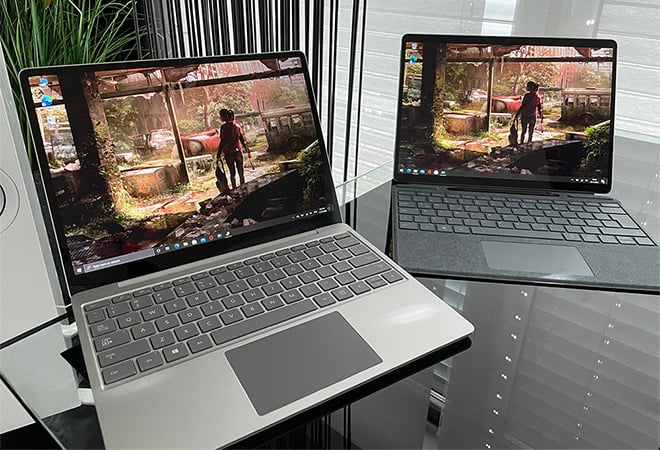 Two laptops sitting on a polish glass surface.
Two laptops sitting on a polish glass surface.
The same principle applies to your laptop. Apply a laptop on a desk or a table, and if you must put information technology on your lap, endeavor and limit the time it sits there. You tin besides utilize a laptop cooling platform, which should take a built-in fan to accident cool air up toward your laptop. Cooling pads also permit y'all use your laptop on your lap without worrying about overheating. Merely don't exit your laptop out in the dominicus for too long, because that will make information technology heat up fast!
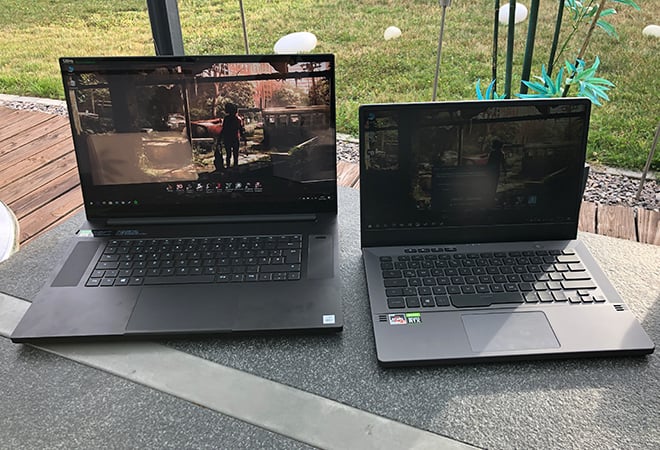 Ii laptops placed on a table outside.
Ii laptops placed on a table outside.
Your laptop or PC casing should have little rubber "feet" on the lesser, which let for a bit of space betwixt the casing and the surface your PC is sitting on. That gap is essential for allowing your calculator to dissipate heat, then if the anxiety have worn down or fallen off, replace them.
2. Make clean your fans and vents
A loud reckoner fan is ofttimes a dusty computer fan. As dust builds upwardly, it prevents the fans from cooling your reckoner's sensitive internal components as finer as they should. Regularly remove grit from the fans and vents to allow your figurer to cool itself efficiently.
Before cleaning your computer, turn it off and unplug all cables and connections, specially the power cablevision.
Choice up a compressed air duster — likewise known as canned air — and spray information technology toward your calculator's vents at an angle. Your goal is to blow the dust abroad, and not back inside your computer'south housing.
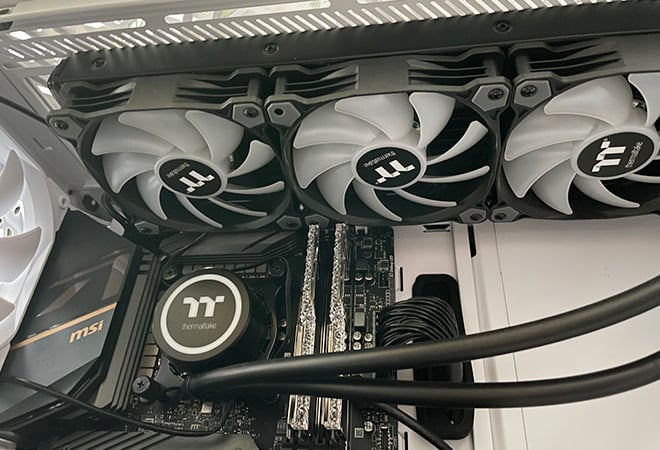 Cooling fans and other hardware inside a PC case.
Cooling fans and other hardware inside a PC case.
If y'all can, open up your estimator to directly clean your CPU fan. If you accept a desktop, yous may observe other fans inside equally well, such as for your RAM or GPU. To remove any grit build-up, spray the fans in curt bursts with your canned air, then wipe down the fans with a microfiber fabric to finish the job. If your desktop computer has a dust filter within, clean this out likewise.
While y'all're at it, clean your power supply fan with the aforementioned combo of compressed air and a microfiber cloth. Power supply fans also get loud if they're too dusty to piece of work properly. Do not open your power supply, but clean it as best you can from the outside.
Finally, inspect the thermal paste on your CPU and any other units that have some. Thermal paste helps your CPU and GPU transfer heat to their heat sinks, and this paste tin wear downward over time, becoming less constructive. If you notice any aging or worn downwardly thermal paste, replace it.
Before closing upwards your computer, double-check that you've plugged all your fans back into the motherboard — otherwise, they won't work at all.
3. Check that your fans are working properly (or supervene upon them)
Now that your calculator fans are prissy and clean, put everything dorsum together and turn on your computer. You're looking to see whether the fans start up and spin normally. If and so, then you've done a great chore — merely exist sure to monitor your CPU and GPU temperatures for a while to make sure everything's working ordinarily.
But, if your estimator fans are still making noise, or if they don't work at all, it may be time to replace them. Check and confirm your fans' dimensions before ordering new ones, or else y'all may be stuck with shiny new fans that don't fit within your PC.
While you can replace most fans individually, if your ability supply fan doesn't work, replace the entire ability supply unit of measurement. Slap-up open the power supply can exist dangerous. Also, an overheating power supply may exist unable to sufficiently power all the components in your computer. So rather than supplant the fan, upgrade to a more powerful power supply instead.
How to keep your computer from getting and then hot
Your fans can only practise so much to manage your figurer'south rut levels. If your desktop or laptop fans are still running loud after you've cleaned them, they may simply exist overworked. Software issues may likewise be responsible for making your reckoner fans so loud — either something's non working as it should, or your hardware isn't powerful enough to run the software yous're using.
Older and less-powerful computers may struggle to go on upwardly with mod video games — such as GTA V, Dark Souls, and Ark: Survival Evolved — also as other complex applications, like multimedia editing software. Meanwhile, many types of malware can overstress your CPU.
A dedicated functioning optimization tool volition ensure that your computer's resources are properly allocated at all times. AVG TuneUp will place and conciliate unneeded programs so that you lot don't waste CPU power on software y'all're non using.
AVG TuneUp volition likewise keep your hard drive clean and tidy by removing junk files, temporary data, unwanted bloatware, and other pointless files. An efficient figurer is a cool computer, and a absurd figurer is a quiet reckoner.
Check Chore Managing director for resource-hungry programs
Task Director will show yous which programs are using which of your figurer's resources, and how much. It's an piece of cake manner to identify resources-hogging apps that might be overheating your calculator and causing all that desktop or laptop fan noise.
Afterwards you identify the programs responsible for hogging your CPU and disk space, you can uninstall or update them as needed.
-
Right-click your taskbar and select Task Manager.
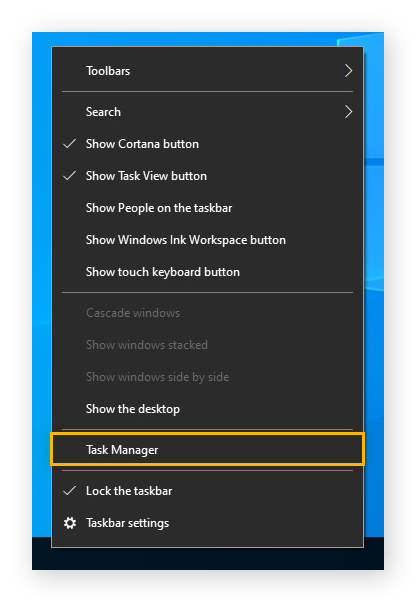
-
Click the CPU tab to sort all agile processes past the percentage of your CPU they're consuming. This will place the most resource-demanding programs correct at the summit.
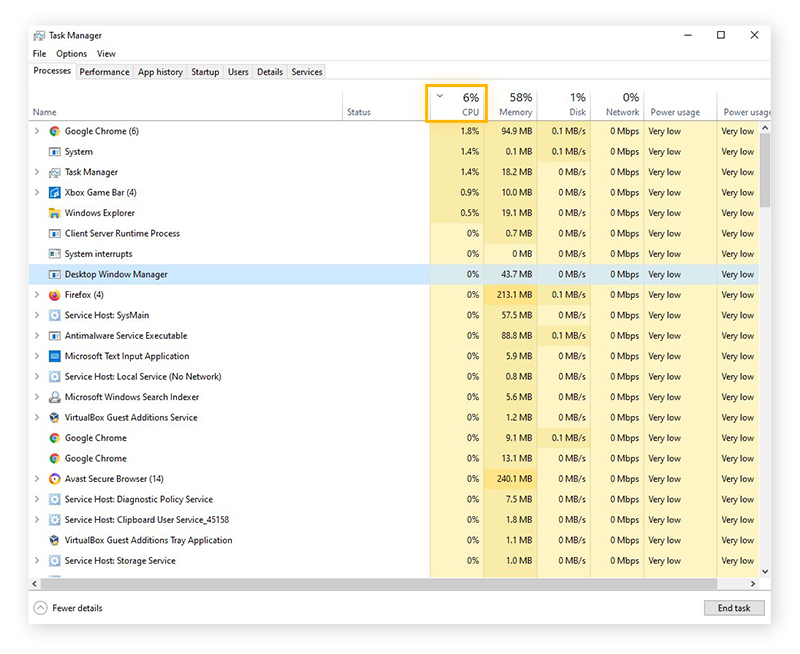
Information technology's normal to see some programs taking up large amounts of your CPU for a split second or ii. Only if you notice sure programs consistently sitting at the top and consuming double-digit CPU resources, brand a annotation and conduct further research.
Updating or reinstalling the troublesome program might help at-home things down and reduce your fan noise. This especially applies to your graphics driver. If your GPU fan is making a lot of racket, update your drivers and run into if the fans quiet down.
AVG Driver Updater makes updating your drivers incredibly easy by scanning your figurer and automatically updating any outdated or malfunctioning drivers.
-
Switch to the Deejay tab. This will prove you which programs are taking up the most storage space.
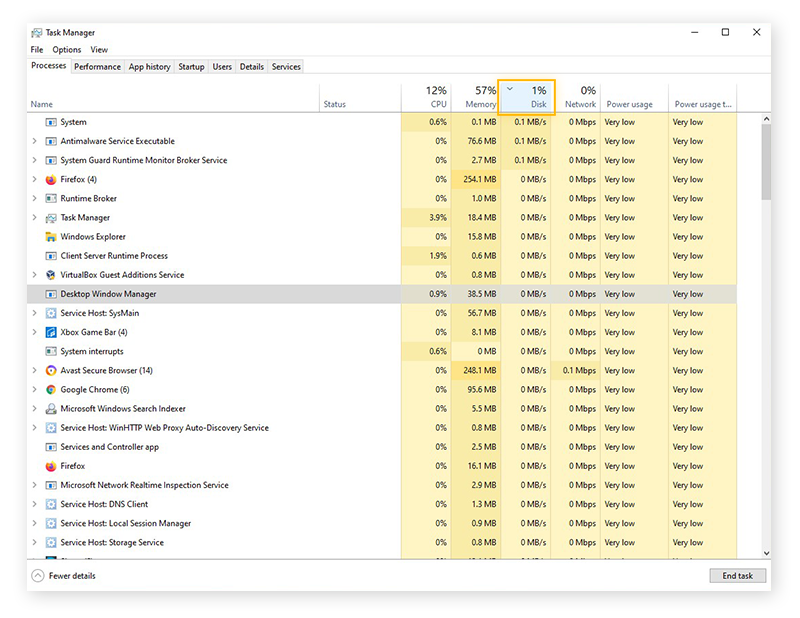
Having your calculator sit at 100% deejay usage is a mutual cause of loud fan racket and other performance issues. Disk usage bug can ofttimes be resolved by updating Windows, removing malware, disabling the Windows Superfetch service, or immigration out junk files with a performance optimizer similar AVG TuneUp.
If you're seeing consistently high disk usage, run the CHKDSK system tool to diagnose any hard drive errors.
Remove and foreclose malware infections
Many types of malware eat up large portions of your computer's resources and storage. Viruses and worms volition pig both equally they replicate and store copies of themselves in your computer. Adware will chew through CPU usage as it showers you in popular-up ads, while cryptominers — malicious programs or browser scripts that force your computer to mine cryptocurrencies for a hacker's benefit — can cause serious overheating issues.
A malware detection and removal tool from a reputable provider is your strongest ally in the fight confronting resources-hogging malware. AVG AntiVirus FREE automatically scans, detects, and removes all types of malware, while also keeping y'all protected confronting hereafter infections.
Without malware gobbling upwardly your CPU power and disk space, your fans will have a much easier job.
Optimize your computer's performance with AVG TuneUp
AVG TuneUp is a specialized functioning booster that ensures your figurer always uses its resources as efficiently as possible. Here's how to utilize it to sharpen your computer'due south performance. First download and install AVG TuneUp.
Apply Slumber Mode to deactivate unneeded programs
AVG TuneUp'southward patented Slumber Style feature detects programs that chew through system resource by running in the background when you lot don't need them. It'll hibernate these programs, and then wake them dorsum up as soon every bit you need to use them again.
That saves CPU ability and RAM for what you really need and helps keep your CPU temperatures down, which, in plow, makes your calculator fan's job a whole lot easier.
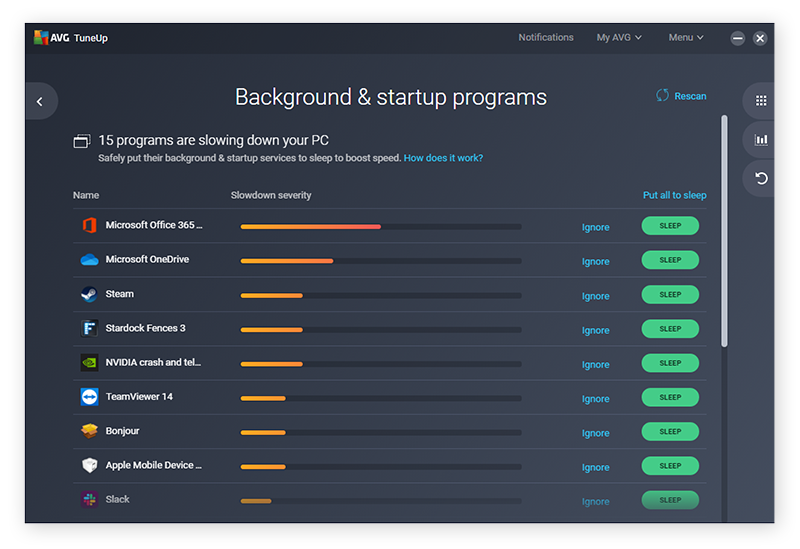
Automatically clean out junk files
Windows is constantly creating temporary files in your system as it works. If left lonely, these junk files can have up a lot of infinite on your bulldoze. Deleting this junk may ready those nasty 100% disk usage alerts and tin help reduce the strain on your computer fans.
AVG TuneUp's Disk Cleaner removes all sorts of junk files — not only temporary files, only too crash reports, cache files, thumbnails, unneeded install files, "recently used files" lists, and more.
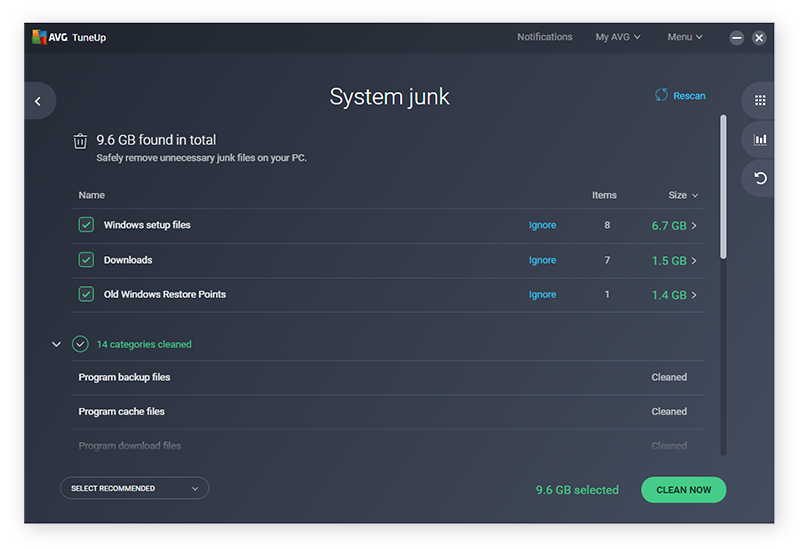
Get rid of bloatware and other unwanted programs
Bloatware refers to programs y'all don't desire or demand, but are on your computer anyway. These programs and other similar software tin can cause fan problems for 2 reasons: they tin can suck up valuable CPU processing power and occupy precious hard drive space.
A shortage of CPU ability or storage space tin can force your calculator to work harder than information technology unremarkably should, which means — you guessed it — loud fan noise. You lot can easily remove these apps from your computer with AVG TuneUp's bloatware removal tool.
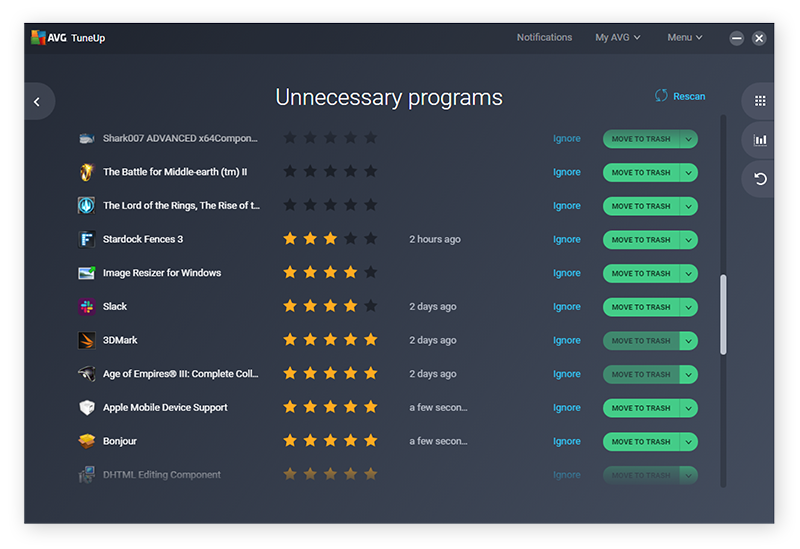
Optimize your PC's performance with AVG TuneUp
If you're overwhelming your computer with too many resource-hungry programs and loads of junk files, it's no wonder your fans are loud and going haywire. AVG TuneUp is a comprehensive PC optimization suite with an array of tools specially designed to boost your computer's operation.
AVG TuneUp will remove all the junk files, bloatware, and other unneeded data that's preventing your computer from performing at its all-time. And the congenital-in Sleep Fashion will place resource-hungry apps and send them into hibernation until you really need them. With a more efficient PC, your computer fans will be much happier — and quieter.
Source: https://www.avg.com/en/signal/fix-loud-computer-fan
0 Response to "Computer Fan Slows Down and Starts Up Again"
Post a Comment